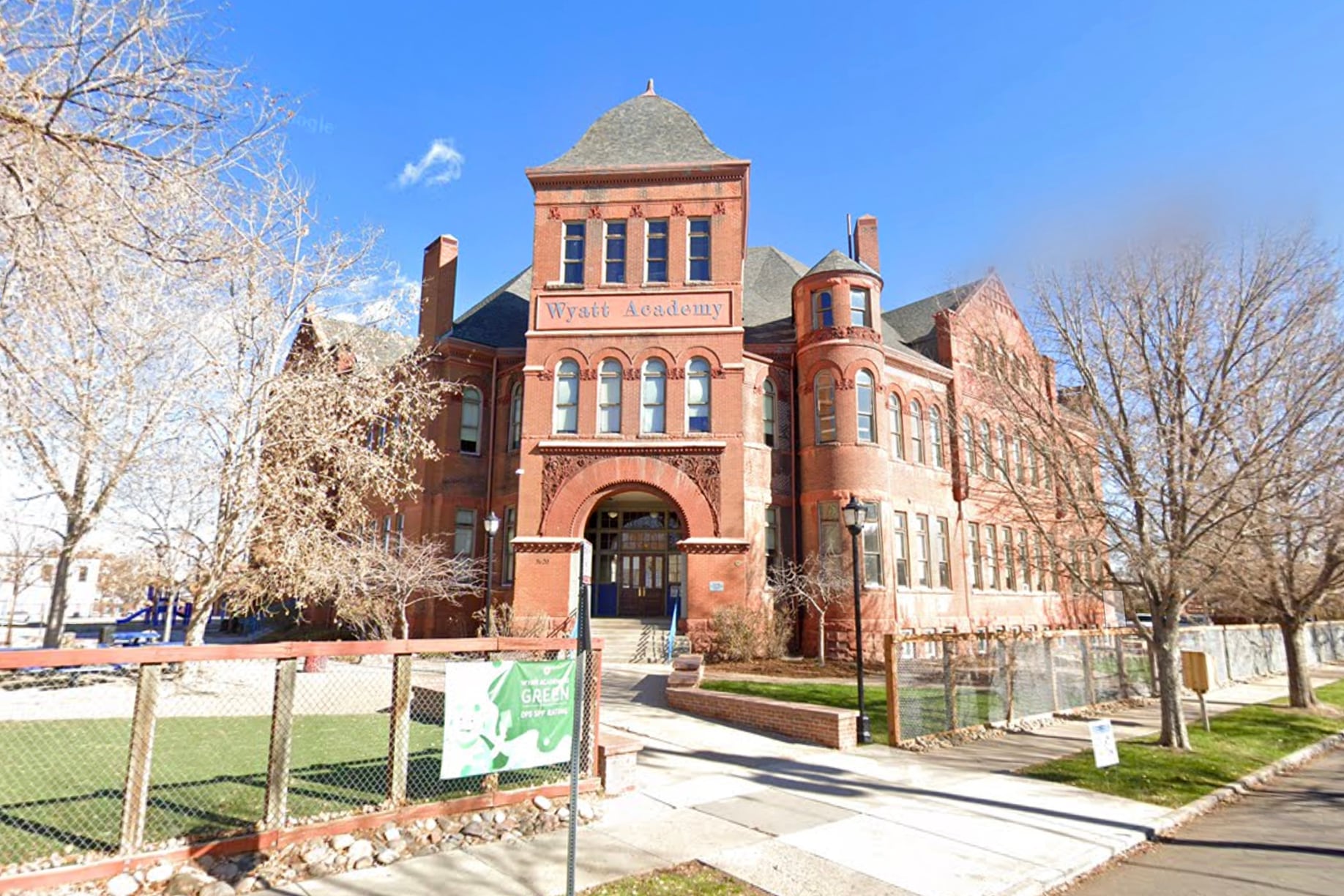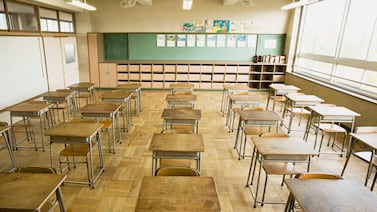Sign up for Chalkbeat Colorado’s free daily newsletter to get the latest reporting from us, plus curated news from other Colorado outlets, delivered to your inbox.
This story has been updated to include that five board members resigned from Wyatt Academy’s board after the meeting Tuesday.
Following the presentation of a plan by Wyatt Academy’s principal to keep the school open, the Denver charter school’s board of directors rejected a proposal Tuesday to close it.
Five of Wyatt’s nine board members voted to close the school, and four voted to keep it open. Although a majority voted for closure, the proposal needed a 60% approval rate to pass, board President Katie Brown said during the early-morning meeting. As such, the proposal failed.
Brown quickly adjourned the meeting without discussing next steps for Wyatt. In a statement released a few hours later, she implied the school would stay open.
After the meeting Tuesday, Brown and the four other board members who voted to close Wyatt resigned from the board, a spokesperson confirmed.
Wyatt Academy is one of Denver’s oldest charter schools. Opened in 1998, it now serves just over 200 students in kindergarten through fifth grade in northeast Denver.
Late last month, the Wyatt board took a different vote that signaled Wyatt would likely close at the end of this school year. Citing years of low enrollment at Wyatt and a decrease in per-pupil funding, the board voted to partner with a Denver-based charter school network called University Prep that runs two elementary schools in the same part of the city.
The unique agreement said U Prep would get whatever money remained in Wyatt’s bank account when the school closed. Wyatt would get a commitment that U Prep would consider continuing some of the community services Wyatt provides, including a food pantry, free clothing boutique, and laundromat.
Without such an agreement, any money left in Wyatt’s bank account would have gone to Denver Public Schools, the district that authorized it. That’s what usually happens when Denver charter schools close, as at least 14 have done in the past five years, many due to declining enrollment.
After the Wyatt board approved the partnership, it told Wyatt families to find new schools for next year and encouraged them to consider U Prep. The news caused swift backlash from parents, students, teachers, and community members who pleaded with the board to keep Wyatt open. It also caused confusion because the Wyatt board had not yet voted to surrender the school’s charter, a necessary step for closure.
So two weeks after approving the partnership, the board met Tuesday morning to vote on whether to surrender Wyatt’s charter. Wyatt Principal Melody Means gave a presentation outlining how Wyatt could boost enrollment and funding.
“We have not exhausted our options yet for us to close our doors today,” Means said.
Her plan focused on recruiting new students and raising money several different ways, some of which she said only surfaced after news got out about Wyatt’s potential closure. Means said she’d been in touch with big-money donors, at least one of whom is willing to give Wyatt a six-figure grant, though she said she couldn’t disclose names or details.
She said she’d also been approached by an organization serving migrant families from Venezuela. The organization floated the idea of encouraging Venezuelan families to enroll their children at Wyatt if the school would give the organization some classrooms.
The organization’s teachers would teach the migrant students for part of the day to more gradually acclimate them to school in Denver — an arrangement that Means said Wyatt could accommodate because it’s an independent charter school overseen by its own board.
In addition, Means said another elementary charter school in Denver reached out about subletting space in Wyatt’s building, a large, historical structure built in the 1880s. That arrangement would not boost Wyatt’s enrollment, but it would bring in revenue.
Through those efforts, plus the opening of a new apartment building nearby, Means said Wyatt could increase its enrollment to more than 230 students by the 2027-28 school year, which she said would bring in enough per-pupil funding to sustain the school.
Her plan also included a 13% salary boost for Wyatt’s teachers. One reason the Wyatt board was considering closing the school was that Wyatt’s salaries are lower than what DPS pays teachers to work at district-run schools, making it hard for Wyatt to hire and retain staff.
Most board members stayed silent during the meeting. Board member Brandon De Benedet was one of the few to question Means’ plan. He repeatedly called it impractical.
“My gut reaction is this is a very unrealistic set of circumstances,” he said.
De Benedet was one of the five board members to vote for closure. The other four were Brown, board Vice President Amy Younggren, and board members Tyler Lane and Harsha Sekar.
Later Tuesday, all five resigned from the Wyatt board.
Board members Nicole Servino, Terry Usry, Gamaliel Whitney, and Rob Hayes voted against surrendering Wyatt’s charter. None explained their vote, though Servino pointed out that Wyatt earned the highest state rating this year, signified by the color green, based on its test scores.
The Wyatt board released a short statement following the vote that included a quote attributed to Brown and Younggren. In it, they thanked the community for coming together “during the last several years of under-enrollment” and budget constraints, pointing out that paraprofessionals and even Means, the principal, “have stepped up to teach classes.”
“We know many challenges lie ahead, and we sincerely hope the Wyatt legacy carries on even stronger into the 2024-25 school year,” Brown and Younggren said in the statement.
John Loughridge has been one of the Wyatt parents fighting these past two weeks to keep the school open, and he watched the board’s 7 a.m. virtual meeting Tuesday.
“I’m just so incredibly thankful that the good side won,” he said in a phone interview after the vote. “My spouse and I, we cried. This has been an emotional roller coaster.”
Loughridge’s son is in third grade at Wyatt and his daughter attends a nearby preschool. Even though Wyatt told families to find new schools for next year, Loughridge listed Wyatt as the top choice for both of his children next year — his son for fourth grade and his daughter for kindergarten — on their DPS school choice applications, which were due Monday.
“I had faith that the right people would make the right decision,” he said.
Melanie Asmar is the bureau chief for Chalkbeat Colorado. Contact Melanie at masmar@chalkbeat.org.







